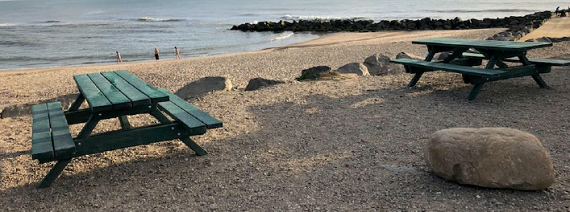
Closing the loop
It came almost as a surprise to know that fishing gear supplier Euronete, through its parent WireCo WorldGroup, has its own recycling division, and this is now working to make use of recycled fishing gear – although the product from this reengineered netting is intended for parks and gardens rather than back to the fishing sector.
Kim Hansen
The background is that during the fuel crisis in the 1970s, the Lankhorst rope manufacturing business, which after the merger with Euronete subsequently became known as the Royal Lankhorst Euronete Group, began recycling its own production waste. This facility, Lankhorst Engineered Products is still in operation Sneek in the Netherlands, while the rope-making side of the company’s activities was shifted to Portugal. Now they are working with Danish recycler Plastix, using the PE and PP pellets derived from recycled fishing gear, producing garden furniture, and the Lankhorst Engineered Products division is already set up to use this kind of material.
Netting can be recycled into many things – including these robust outdoor benches. The green colour comes from the netting.
‘At our Lankhorst Engineered Products division they have been producing plastic planks and poles there for years, including planks that are used for hard-wearing decking for marinas,’ Euronete’s Jeroen Dorenbusch explained.
‘So we wanted to build on this and explore what else could be produced using recycled material, and came up with outdoor furniture, which is bolted together from these robust planks.’
He added that the target market for these is primarily local authorities looking to place picnic tables and other outdoor furniture in spaces such as public parks, kindergartens and schools, and local government bodies in coastal areas have shown a particular interest in these products.
‘This material is not pure enough for recycling back into fishing gear, so we looked for viable uses for it. Once it has been made into furniture, this has a working lifetime of twenty or thirty years, and the main reason it it taken out of use tends to be vandalism. So this has a very long lifetime – and then it can be put back through the same process to be recycled again.’
He commented that for a fishing gear manufacturer, it is convenient to be able to close the loop. Fishing gear comes back after having been used, gets recycled at Plastix in Denmark, and then comes to Holland to be re-engineered into another product.
‘As a group, we are bringing together fishing and recycling to ensure that the loop is closed, and for us as a group it’s important to develop this responsible use of plastics and to work with co-operatives, net lofts and fishing companies to encourage them to take part in this by offering their waste to the recycling industry. As a manufacturer of ropes and netting, we are very much aware that this is going to be a challenge for the industry in the coming years and that we will have to take responsibility for the waste stream as we see the EU developing its proposals for Extended Producer Responsibility (EPR) in the future,’ he said.
‘It’s important for Euronete to commit to handling these waste products and to find a decent and viable use for this material. We want to demonstrate that this material is not necessarily waste, but is a raw material that genuinely has a use.’
Benches made from recycled netting will be on show at the Holland Fisheries Event.
Retrieved from: https://main-hookandnetmag-hookandnet.content.pugpig.com/2018/09/20/2018-09euronetebenches/pugpig_index.html
